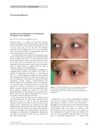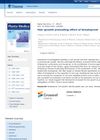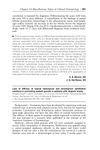 3 citations,
March 2023 in “JAAD case reports”
3 citations,
March 2023 in “JAAD case reports” Upadacitinib cleared scalp alopecia areata in three patients and also improved atopic dermatitis with minimal side effects.
3 citations,
October 2021 in “Clinical, Cosmetic and Investigational Dermatology” Setipiprant did not significantly improve hair growth in men with hair loss.
July 2024 in “International Journal of Molecular Sciences” The inhibitor DPP can promote hair growth.
26 citations,
August 2008 in “Clinical endocrinology” The document concludes that more multidisciplinary research is needed to understand and treat PCOS, a condition that significantly affects women's health and quality of life.
17 citations,
November 2021 in “Journal of Cosmetic Dermatology” Combination therapies for androgenetic alopecia work best but can have significant side effects and costs.
 5 citations,
January 2023 in “Journal of the European Academy of Dermatology and Venereology”
5 citations,
January 2023 in “Journal of the European Academy of Dermatology and Venereology” Experts advise using sunscreen and proper skin care before, during, and after procedures to speed healing, prevent complications, and reduce scarring.
5 citations,
July 2020 in “Recent patents on inflammation & allergy drug discovery” Childhood Alopecia Areata causes hair loss and requires varied treatments, with psychological support being crucial.
 4 citations,
January 2022 in “Life”
4 citations,
January 2022 in “Life” Tissue engineering could be a future solution for hair loss, but it's currently expensive, complex, and hard to apply in real-world treatments.
 1 citations,
January 2022 in “Faculty reviews”
1 citations,
January 2022 in “Faculty reviews” The best long-lasting results in treating hair loss may be achieved through combination therapy, including treatments like finasteride, minoxidil, and platelet-rich plasma injections.
 October 2023 in “Biomaterials”
October 2023 in “Biomaterials” Nanotechnology could improve hair regrowth but faces challenges like complexity and safety concerns.

New treatments for hair loss should target eight main causes and use specific plant compounds and peptides for better results.
March 2021 in “Annals of palliative medicine” Plum-blossom needling with conventional treatments improves hair regrowth in alopecia areata.
 January 2014 in “Cosmoderma”
January 2014 in “Cosmoderma” The document concludes that personalized treatment plans for hair loss in Asian men are necessary and more research is needed to develop effective guidelines.
January 2023 in “Pharmaceutics” AA–TF#15 significantly promotes hair regrowth and could be an effective treatment for androgenic alopecia.
 December 2015 in “Journal of skin and stem cell”
December 2015 in “Journal of skin and stem cell” Using a gel called Diclofenac can potentially cause hair to grow back in bald spots in older men.
January 2015 in “American journal of medical and biological research”  15 citations,
January 2019 in “International Journal of Women's Dermatology”
15 citations,
January 2019 in “International Journal of Women's Dermatology” Early treatment helps stop hair loss in women of color.
 22 citations,
August 2017 in “Stem cells and cloning”
22 citations,
August 2017 in “Stem cells and cloning” Stem cell technologies and regenerative medicine, including platelet-rich plasma, show promise for hair restoration in treating hair loss, but more research is needed.
 55 citations,
March 2009 in “Journal of The American Academy of Dermatology”
55 citations,
March 2009 in “Journal of The American Academy of Dermatology” Topical latanoprost and bimatoprost eye solutions don't help eyelash growth in people with alopecia areata.
35 citations,
March 2010 in “British journal of dermatology/British journal of dermatology, Supplement” The study showed that mouse eyelashes can be used to study eyelash growth and that bimatoprost makes them longer and more numerous.
 15 citations,
November 2009 in “Clinical and Experimental Dermatology”
15 citations,
November 2009 in “Clinical and Experimental Dermatology” Bimatoprost helped a girl grow her eyelashes back quickly and without serious side effects.
9 citations,
January 2019 in “Dermatology Online Journal” Laser-assisted delivery of PRP, with or without bimatoprost and minoxidil, can effectively stimulate hair growth.
 5 citations,
January 2022 in “Drug Delivery”
5 citations,
January 2022 in “Drug Delivery” Bimatoprost cream can help regrow hair in baldness.
 1 citations,
August 2011 in “Planta Medica”
1 citations,
August 2011 in “Planta Medica” Bimatoprost effectively promotes hair growth.
 January 2014 in “Jaypee Brothers Medical Publishers (P) Ltd. eBooks”
January 2014 in “Jaypee Brothers Medical Publishers (P) Ltd. eBooks” Bimatoprost may help with hair loss.
 July 2013 in “Journal of clinical & experimental dermatology research”
July 2013 in “Journal of clinical & experimental dermatology research” Bimatoprost can help treat hair loss.
 January 2010 in “Yearbook of Dermatology and Dermatologic Surgery”
January 2010 in “Yearbook of Dermatology and Dermatologic Surgery” Topical latanoprost and bimatoprost ophthalmic solutions don't help eyelash growth in patients with alopecia areata.
July 2022 in “Dermatologic Therapy”  July 2023 in “GLOBAL JOURNAL FOR RESEARCH ANALYSIS”
July 2023 in “GLOBAL JOURNAL FOR RESEARCH ANALYSIS” The new treatment showed promise in managing eyebrow hair loss.
1 citations,
January 2013 Bimatoprost treats glaucoma and promotes hair growth, with potential for more medical uses.


















